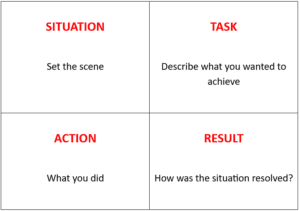These are not the same as the “walk me through your CV” or “tell me about what you did at Company X”.
What is a competency-based interview question?
These are questions designed to reveal your personal characteristics or experience and also to enable the interviewer to evaluate it. These interview questions are often characterised by the phrase “tell me about a time when…” or “give an example of when you…..”.
Competency-based interview questions always require an example of something you’ve done in the past. (In contrast, standard interview questions such as ‘What are your strengths and weaknesses?’, don’t explicitly call for examples, although it’s always great to provide one.)
What skills is the interviewer testing with competency-based questions?
The original “competency” interview framework was often HR devised/led. It focused on personal and character skills which you would be invited to demonstrate. For example “communication skills”, “teamwork”, “leadership” etc.
However typically now it’s a lot broader, covering all aspects of skills, knowledge/experience and behaviours you’ll bring into the role. Employers will use open questions to discover real-life scenarios where you can demonstrate you used your competencies to the best effect. Sometimes different interviewers will have the same questions which can lead to a common, standard assessment.
The good news for the candidate is that this can give the opportunity to showcase skills and experience. The bad news is that these open-ended questions can also give the opportunity to be overly loquacious and drift away from the point!
As with all interviews, preparation is key
Ensure you have the original job advertisement and (ideally) the job spec for the role. Read both the job description and the candidate requirements. Ensure you can give examples in your recent career which demonstrate your suitability your competency and address the key requirements. You definitely don’t have to cover all aspects of the job. Nevertheless you should be able to articulate clearly as many of the “requirements” whether they be “experience” related or behaviour/personality features.
If there are areas you can’t demonstrate with prior experience then a decent fallback is to consider how you would approach a situation or might demonstrate a characteristic.
But don’t rehearse to the point where you sound robotic.
The STAR approach to tackling an interview question
At interview you should consider structuring each example using the STAR technique: Situation, Task, Action, Result.

This means setting the scene (situation), describing what you wanted to achieve (task), communicating what you actually did (action), and then talking about the result – how was the situation resolved? How did your actions affect the outcome?
When delivering your response to the question keep the following in mind:
- Keep a positive tone throughout.
- Don’t focus on negatives or criticise others.
- Emphasise how you contributed to the successful outcome.
- Don’t be bashful: many people say “we“ because they want to come over as a team player but the result is often that you undermine yourself and your contribution.
- Results are best evidenced by numbers.
- In some cases add an additional sentence or two to explain what you learned from the experience. What would you do differently next time?
Demonstrate your competencies with relevant examples
Your examples must be tailored to the competencies required for the role you’re applying for. But don’t fall into the trap of being too verbose: brevity is key and the most important parts are action and results.
If in doubt either ask how detailed your reply should be. Alternatively give a short-ish version and ask the interviewer if they would like more information. Many competency-based questions have a series of follow up queries in any event.
Don’t be afraid to take a moment to consider your answer. Or to clarify the question. Like with an exam it’s easy to launch into an answer relating to the question you THOUGHT was asked rather than what was actually wanted.
Next steps
If the recruiter and employer are being very structured, they will allocate a score to the answers which helps with comparing applicants.
This might be based around:
- Do you have demonstrable experience of the required competency or skill?
- Are your examples relevant?
- Have you articulated your role and your action, and your contribution to outcomes?
While you don’t want to put the interviewer in a difficult position or overrun your allocated time there is no harm in asking whether they were happy with your answers or require more information. They will rarely take you up on the offer. However it shows you are concerned to demonstrate your relevance for the role.
For more career and interview advice including pre-interview preparation for candidates see our Candidate Advice Guides.


